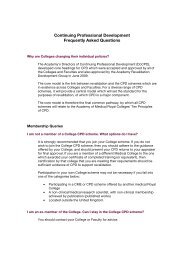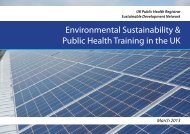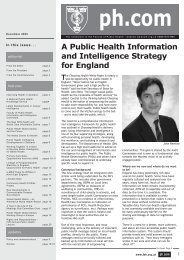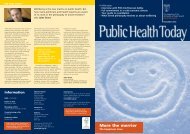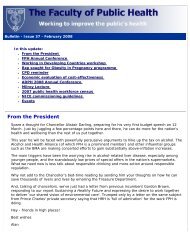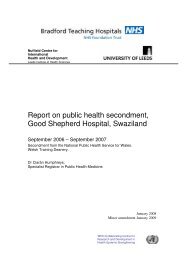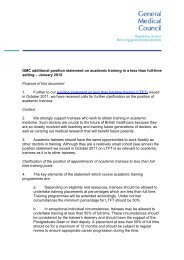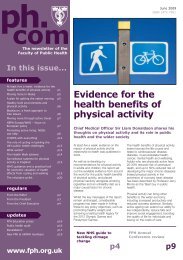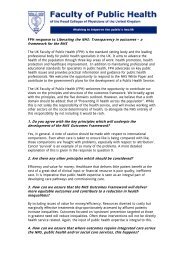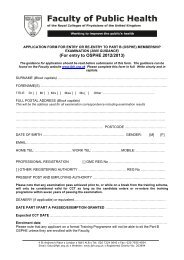A Chronology of State Medicine, Public Health, Welfare and Related ...
A Chronology of State Medicine, Public Health, Welfare and Related ...
A Chronology of State Medicine, Public Health, Welfare and Related ...
You also want an ePaper? Increase the reach of your titles
YUMPU automatically turns print PDFs into web optimized ePapers that Google loves.
1856<br />
Poor Law Administration Act (10&11 Vict., c.109) revised <strong>and</strong> consolidated previous<br />
legislation setting out rules <strong>and</strong> principles for the administration <strong>of</strong> the poor laws. The<br />
intention was to ensure more humane practice than that <strong>of</strong> many boards <strong>of</strong> guardians, but the<br />
new powers were used sparingly <strong>and</strong> the enforcement <strong>of</strong> the principles gradually fell into<br />
desuetude. See 1860.<br />
Hours <strong>of</strong> Labour <strong>of</strong> Young Persons <strong>and</strong> Females in Factories Act (10&11 Vict., c.29),<br />
the Ten Hours Act, reduced the permitted maximum hours <strong>of</strong> work for women <strong>and</strong> children<br />
to 10 hours per day <strong>and</strong> 58 hours in any one week. See 1850.<br />
Corn Laws, which imposed duties on imported corn, repealed (10&11 Vict., c.1, 2 <strong>and</strong><br />
3).<br />
1847 Cont - 1848<br />
1847 cont Select Committee on Medical Registration reported.<br />
Sir James Simpson introduced chlor<strong>of</strong>orm as an anaesthetic. See 1858<br />
Dr WH Duncan (1805-63) appointed medical <strong>of</strong>ficer <strong>of</strong> health for Liverpool (see<br />
1846).<br />
Building started <strong>of</strong> Edwin Ackroyd's model industrial community at Copley, near<br />
Halifax. See 1853.<br />
1848 Major cholera epidemic in Engl<strong>and</strong> <strong>and</strong> Scotl<strong>and</strong> with over 60,000 deaths, including<br />
about 14,000 in London.<br />
Influenza p<strong>and</strong>emic; there were about 50,000 deaths in London alone.<br />
<strong>Public</strong> <strong>Health</strong> Act (11&12 Vict., c.63) created a new central department, the General<br />
Board <strong>of</strong> <strong>Health</strong>, under a nominated president, <strong>and</strong> provided for local boards <strong>of</strong> health to be<br />
set up; in municipal boroughs these were to be the town councils, elsewhere they were to be<br />
special boards elected by the rate payers on the same footing as the election <strong>of</strong> boards <strong>of</strong><br />
guardians. Each board <strong>of</strong> health was empowered to appoint a surveyor, an inspector <strong>of</strong><br />
nuisances, a treasurer, a clerk <strong>and</strong> an "<strong>of</strong>ficer <strong>of</strong> health" who had to be a legally qualified<br />
medical practitioner. The appointment <strong>of</strong> the <strong>of</strong>ficer <strong>of</strong> health <strong>and</strong> his removal was subject to<br />
the approval <strong>of</strong> the General Board <strong>of</strong> <strong>Health</strong>. The act contained numerous sanitary clauses<br />
including the cleansing <strong>of</strong> sewers, sanitation <strong>of</strong> houses, supervision <strong>of</strong> lodging houses <strong>and</strong><br />
slaughter- houses, <strong>and</strong> maintenance <strong>of</strong> pavements. The General Board had no system <strong>and</strong> no<br />
powers to enforce effective local action where the clauses <strong>of</strong> the act were not adopted locally.<br />
This is the first act in which the term "public health" appears. The act did not cover London<br />
or Scotl<strong>and</strong> (see 1849); London operated under the Metropolitan Commission <strong>of</strong> Sewers Act<br />
(11&12 Vict., c.112). See 1851, 1854, 1855 <strong>and</strong> 1858.<br />
Nuisances Removal <strong>and</strong> Diseases Prevention Act (11&12 Vict., c.123) legislated in<br />
regard to the removal <strong>of</strong> nuisances <strong>and</strong> the prevention <strong>of</strong> epidemic diseases in places where<br />
the <strong>Public</strong> <strong>Health</strong> Act was not in force, <strong>and</strong> gave power for the Poor Law Commissioners to<br />
compel guardians to execute regulations <strong>and</strong> directions <strong>of</strong> the General Board <strong>of</strong> <strong>Health</strong>. In<br />
Scotl<strong>and</strong> the Board <strong>of</strong> Supervision exhorted the parochial boards to take action. See 1849.<br />
Metropolitan Commission <strong>of</strong> Sewers Act (11&12 Vict., c.112) established the<br />
Commission in regard to London except for the City which operated under its own City<br />
Sewers Act (11&12 Vict., c.163).<br />
Spreading <strong>of</strong> Contagious or Infectious Disorders among Sheep, Cattle <strong>and</strong> other<br />
Animals Act (11&12 Vict., c.107) introduced penalties for exposing for sale meat unfit for<br />
human consumption, <strong>and</strong> gave powers for the destruction <strong>of</strong> such meat. Regulations to be<br />
made by the Privy Council. See 1866.



